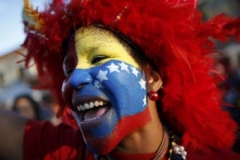'He's back!' Chavez in Venezuela after cancer surgery
Even as passionate supporters took to the streets in noisy celebration, and foreign dignitaries sent congratulations and urged Chavez to rest, the next step for the oil-rich country and its colorful leader remained unclear.
"The president is well, he is conscious, he is very happy and motivated being back in his Venezuelan homeland," Vice President Nicolas Maduro told reporters as he left the military hospital where Chavez is being treated.
"We are all sharing that great joy, and motivation with the people," Maduro added.
But when, if at all, Chavez, who has undergone surgery four times since mid 2011, will be sworn in by the Supreme Court to begin the new term he won in elections last autumn is a mystery.
A Supreme Court source said the tribunal is ready and waiting for the go-ahead from the president and his medical team.
The ceremony does not have to be public, the source said, suggesting it could even be done from Chavez's hospital bed. Indeed, as soon as Venezuela's 58-year-old leader arrived he was hospitalized again for more treatment.
The most visible face of the Latin American left, the garrulous populist is a persistent thorn in the side of Washington for his alignment of oil-rich Venezuela with nations such as Iran, Syria and Cuba.
In his homeland, past weeks have seen citizens perplexed and many sharply divided over Chavez's future, with the opposition asserting that the government has been withholding information on his health.
The president announced his return on Twitter -- he has nearly four million followers -- and his arrival at Caracas airport was not broadcast on TV.
The latter step was unusual in this country he so thoroughly dominates both politically and personally.
"We have arrived again in our Venezuelan homeland," Chavez wrote. "Thank you, God. Thank you, my beloved people. We will continue my treatment here."
Chanting and banner-waving supporters gathered outside his hospital and Chavez supporters danced and sang in the city's central Plaza Bolivar.
Venezuelans had neither seen nor heard from the usually ubiquitous leader since he left for Cuba on December 10 for his latest round of cancer surgery, though on Friday the government released photos of him bedridden but smiling.
The government said then it was hard for Chavez to speak because he has been fitted with a tracheal tube, due to a post-operative respiratory infection.
State-issued updates on his condition have been sketchy, fueling speculation that the president was worse off than officials admit.
The government had never said what kind of cancer he had nor when he might return home. Now, seemingly out the blue, Chavez is back.
From Cuba, Fidel Castro hailed his long-time friend's return, saying a long and anxious wait is over for the Venezuelan people thanks to Chavez's "stunning physical stamina and the total dedication of the doctors."
Ecuadoran President Rafael Correa, himself re-elected on Sunday and a close Chavez ally, jokingly said he had received congratulations from Chavez.
"I really, really appreciate your congratulations, Commander Chavez, but I am angry. Forget about me and get some rest," Correa said. "Venezuela, your beloved Latin America and we, your friends, all need you."
Chavez, who has been in power for more than 14 years, had declared himself free of cancer after earlier rounds of surgery and went on to win another six year term in elections last October.
But he later suffered a relapse and after the surgery on December 11 in Havana he was too sick to return home for his scheduled inauguration on January 10.
The inauguration has been postponed indefinitely, and Maduro, Chavez's handpicked political heir, has essentially been running Venezuela in Chavez's absence.
Conservative opposition leader Henrique Capriles, whom Chavez defeated in October, tweeted: "May the president's return mean that Mr Maduro and ministers get down to work. There are thousands of problems to be fixed."
Pollster Luis Vicente Leon said uncertainty remains over whether illness will force Chavez to step down and call early elections.
A poll released Sunday said that if elections were held now between Maduro and Capriles, the former would win by 14 percentage points.
What the stars mean:
★ Poor ★ ★ Promising ★★★ Good ★★★★ Very good ★★★★★ Exceptional
Related Contents
Latest News
More News
- Russian President congratulates Vietnamese Party leader during phone talks (January 25, 2026 | 09:58)
- Worldwide congratulations underscore confidence in Vietnam’s 14th Party Congress (January 23, 2026 | 09:02)
- Political parties, organisations, int’l friends send congratulations to 14th National Party Congress (January 22, 2026 | 09:33)
- 14th National Party Congress: Japanese media highlight Vietnam’s growth targets (January 21, 2026 | 09:46)
- 14th National Party Congress: Driving force for Vietnam to continue renewal, innovation, breakthroughs (January 21, 2026 | 09:42)
- Vietnam remains spiritual support for progressive forces: Colombian party leader (January 21, 2026 | 08:00)
- Int'l media provides large coverage of 14th National Party Congress's first working day (January 20, 2026 | 09:09)
- Vietnamese firms win top honours at ASEAN Digital Awards (January 16, 2026 | 16:45)
- ASEAN Digital Ministers' Meeting opens in Hanoi (January 15, 2026 | 15:33)
- ASEAN economies move up the global chip value chain (December 09, 2025 | 13:32)


 Tag:
Tag:


















 Mobile Version
Mobile Version